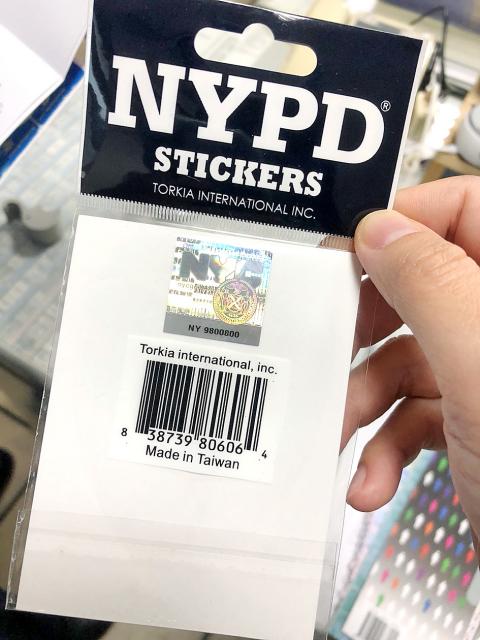President Tsai Ing-wen (蔡英文) yesterday spoke out against a proposal by Kaohsiung Mayor Han Kuo-yu (韓國瑜) to establish a free economic zone in the city, saying it could cause Chinese goods to be mistaken for Taiwanese goods.
If a free economic zone made it unclear whether US-bound goods were Taiwanese or Chinese, the effect on Taiwan from the US-China trade dispute would be greater than elsewhere, so the government is opposed to a free economic zone, Tsai said.
The US-China trade dispute could affect the entire global economy if not reined in, she said.

Photo: Wang Chieh, Taipei Times
Trump on Sunday said that he was considering increasing tariffs on US$200 billion of Chinese goods in response to slow negotiations.
The government was constantly preparing response measures to changes in the global economy, Tsai said.
The most crucial task would be to encourage Taiwanese businesses to bring production back to the nation so that it could export more Taiwanese goods, not Chinese goods, she said.
This would be the best way to avoid high tariffs imposed on China by the US, she said.
Bringing Chinese goods into Taiwan through a free economic zone would tie Taiwan to China’s economy and turn Chinese goods into Taiwanese goods, she said.
“Just as the US-China trade dispute is heating up, there are actually politicians who want to import Chinese tea and process it here so that it becomes ‘Taiwanese tea,’” Tsai said.
Doing so would harm the good reputation that Taiwanese products have and invite retaliation from the US, she said.
Taiwanese would not accept such a scenario, she said.
Taiwan has expanded production and demand for local products domestically and globally, she said, adding that to set up a free economic zone would be a step backward.
Separately yesterday, Han said he was happy to see the issue of free economic zones being discussed.
If the Executive Yuan is planning to promote the idea, he hopes they would “prioritize Kaohsiung and give the city a chance,” Han said at a Kaohsiung City Government question-and-answer session.
His hope was to increase competitiveness by lowering tariffs, and easing restrictions would help accomplish this, he said.
Concerns about Chinese goods being confused for Taiwanese goods were just “one angle,” Han said, adding that the government should test the idea in Kaohsiung.
Although his comments regarding free economic zones might differ from the ideas of economists, hopefully the Executive Yuan would “give Kaohsiung a chance,” he said, adding that he hopes the city would “turn over a new leaf” economically by implementing the idea.

PREPAREDNESS: Given the difficulty of importing ammunition during wartime, the Ministry of National Defense said it would prioritize ‘coproduction’ partnerships A newly formed unit of the Marine Corps tasked with land-based security operations has recently replaced its aging, domestically produced rifles with more advanced, US-made M4A1 rifles, a source said yesterday. The unnamed source familiar with the matter said the First Security Battalion of the Marine Corps’ Air Defense and Base Guard Group has replaced its older T65K2 rifles, which have been in service since the late 1980s, with the newly received M4A1s. The source did not say exactly when the upgrade took place or how many M4A1s were issued to the battalion. The confirmation came after Chinese-language media reported

A Ministry of Foreign Affairs official yesterday said that a delegation that visited China for an APEC meeting did not receive any kind of treatment that downgraded Taiwan’s sovereignty. Department of International Organizations Director-General Jonathan Sun (孫儉元) said that he and a group of ministry officials visited Shenzhen, China, to attend the APEC Informal Senior Officials’ Meeting last month. The trip went “smoothly and safely” for all Taiwanese delegates, as the Chinese side arranged the trip in accordance with long-standing practices, Sun said at the ministry’s weekly briefing. The Taiwanese group did not encounter any political suppression, he said. Sun made the remarks when

The Taiwanese passport ranked 33rd in a global listing of passports by convenience this month, rising three places from last month’s ranking, but matching its position in January last year. The Henley Passport Index, an international ranking of passports by the number of designations its holder can travel to without a visa, showed that the Taiwan passport enables holders to travel to 139 countries and territories without a visa. Singapore’s passport was ranked the most powerful with visa-free access to 192 destinations out of 227, according to the index published on Tuesday by UK-based migration investment consultancy firm Henley and Partners. Japan’s and

BROAD AGREEMENT: The two are nearing a trade deal to reduce Taiwan’s tariff to 15% and a commitment for TSMC to build five more fabs, a ‘New York Times’ report said Taiwan and the US have reached a broad consensus on a trade deal, the Executive Yuan’s Office of Trade Negotiations said yesterday, after a report said that Washington is set to reduce Taiwan’s tariff rate to 15 percent. The New York Times on Monday reported that the two nations are nearing a trade deal to reduce Taiwan’s tariff rate to 15 percent and commit Taiwan Semiconductor Manufacturing Co (TSMC, 台積電) to building at least five more facilities in the US. “The agreement, which has been under negotiation for months, is being legally scrubbed and could be announced this month,” the paper said,